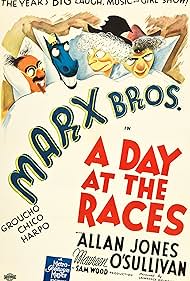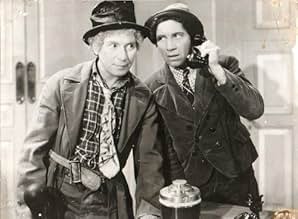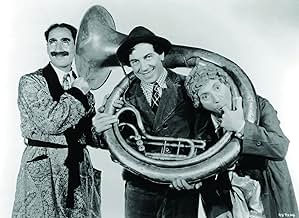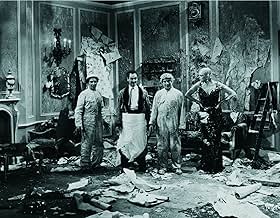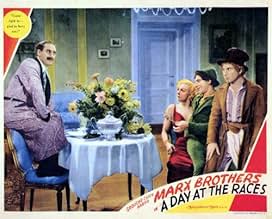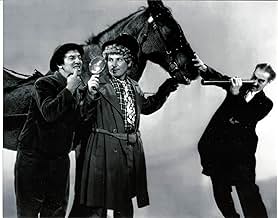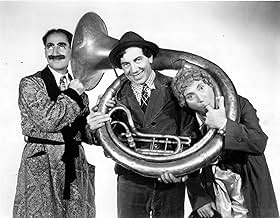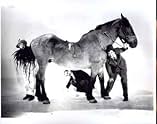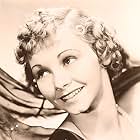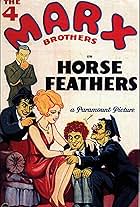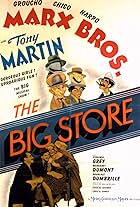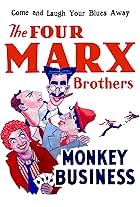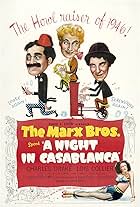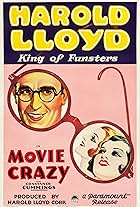A veterinarian posing as a doctor teams with a singer and his friends as they struggle to save an upstate New York sanitarium with the help of a misfit racehorse.A veterinarian posing as a doctor teams with a singer and his friends as they struggle to save an upstate New York sanitarium with the help of a misfit racehorse.A veterinarian posing as a doctor teams with a singer and his friends as they struggle to save an upstate New York sanitarium with the help of a misfit racehorse.
- Nominated for 1 Oscar
- 1 win & 1 nomination total
Sig Ruman
- Dr. Steinberg
- (as Sig Rumann)
Hooper Atchley
- Race Judge
- (uncredited)
King Baggot
- Racetrack Official Starter
- (uncredited)
Kenny Baker
- Party Guest
- (uncredited)
Vivian Barry
- Telephone Girl
- (uncredited)
Featured reviews
"A Day At The Races" is generally considered the last great movie that the Marx Brothers gave us, and I also agree that it's better than anything that followed, though all their 1938-1949 movies have their moments and are most definitely worth seeing for their fans. The secret of this film's success is that, although it remains loyal to the MGM formulas (let's face it, the pre-1935 Marxes would hardly care about a young couple in love, much less devote themselves completely into helping them out), it retains most of their anarchic and destructive spirit: from the biggest (Margaret Dumont's unorthodox "examination") to the smallest (Harpo and Chico paying one of their debts by using and re-using the same 5-dollar bill!) comedy bit, there are many hits and almost no misses here. Where the film does miss slightly is in the musical numbers: these are entertaining in their own right, but they feel tacked-on, as if they've come from a different movie altogether. Plus, there are too many of them, and they go on too long, making "A Day At The Races" the longest - by far - Marx Brothers movie (and to think that there were two more full numbers eliminated before release!). Still, this is good zany fun that mostly lives up to its reputation. *** out of 4.
Overall, this is a good Marx Brothers feature that is sometimes a little uneven, but that looks pretty good as long as you don't compare it with their very best pictures. The basic setup is amusing, and it provides some good material for the cast to work with. Groucho, Chico, and Harpo all get their moments, with Margaret Dumont once again joining in the fun.
The sanitarium setting and Groucho's attempt to run it are used pretty well.
There is a very funny scene when one of the heavies tries to check on Groucho's credentials, and another one when Dr. Hackenbush has to compete with an outside expert (Sig Ruman, who is always fun in this kind of role) for Dumont's confidence.
Not all of it works quite that well, and one or two of the musical numbers could have been skipped with no loss at all. But there are plenty of good moments and creative sequences, and a satisfyingly chaotic finale as good as those in any of their films.
The sanitarium setting and Groucho's attempt to run it are used pretty well.
There is a very funny scene when one of the heavies tries to check on Groucho's credentials, and another one when Dr. Hackenbush has to compete with an outside expert (Sig Ruman, who is always fun in this kind of role) for Dumont's confidence.
Not all of it works quite that well, and one or two of the musical numbers could have been skipped with no loss at all. But there are plenty of good moments and creative sequences, and a satisfyingly chaotic finale as good as those in any of their films.
A DAY AT THE RACES (Metro-Goldwyn-Mayer, 1937), directed by Sam Wood, capitalizes on the current trend of horse-racing movies done by the numbers during the 1937-38 cycle, notably MGM's own 1937 releases of "Saratoga" and "Broadway Melody of 1938" as well as "Stablemates" (1938). Starring those three Marx Brothers, in their second collaboration for MGM, following the enormous success of A NIGHT AT THE OPERA (1935), this horse opera, being the longest running feature film of their screen career, stop-watched at 111 minutes, did prove quite successful then, and because of its good track record, still remains a sure bet comedy today.
The first Marx Brother to be introduced in the story is Chico. He plays Tony, a chauffeur for Judy Standish (Maureen O'Sullivan), whose sanitarium is in financial trouble. Morgan (Douglass Dumbrille), the owner of a nearby racetrack and hotel, along with his associate, Whitmore (Leonard Ceeley) want to take over the sanitarium so to convert it into a gambling casino. He offers Judy the option of accepting $5,000 from them or face a mortgage foreclosure, but she prefers to wait the 30 days. Gil Stewart (Allan Jones) her fiancé, has purchased Hi-Hat, Morgan's race horse, for $1,500, gambling her life savings hoping to win enough money to get Judy out of debt. However, Mrs. Emily Upjohn (Margaret Dumont), an exclusive patient of the sanitarium, expresses her need for a doctor, even though there is really nothing physically wrong with her. Realizing that Mrs. Upjohn's financial support could save the hospital from ruin, Tony notifies Dr. Hugo Z. Hackenbush (Groucho Marx) of Palmville, Florida, who is well acquainted with Mrs. Upjohn, unaware he is a horse doctor, and making him chief of staff. Then there's Stuffy (Harpo), Morgan's jockey, with a natural flair for horses, who gets to ride Hi-Hat, who turns out to be a jumper, as well as quite fearful to the sight and sound of Morgan himself.
The Music and Lyrics by Bronislau Kaper, Gus Kahn and Walter Jurmann: "On the Blue Venetian Waters" (Sung by Allan Jones/ danced by Vivian Fay,recently restored to its original sepia tone); "Tomorrow is Another Day" (sung by Jones); "Blow That Horn, Gabriel," "All God's Chillin' Got Rhythm," "All God's Chillin' Got Rhythm" (reprise/finale), along with "A Message From the Man in the Moon" (sung briefly by Groucho Marx/ otherwise cut from final print, and heard instrumentally during opening credits). "Tomorrow is Another Day" is quite a good tune with Jones in fine voice singing to charming heroine O'Sullivan that shifts into a parade from the black community singing and dancing to "All God's Chuillin Got Rhythm" with the Marxes, headed by Harpo playing a flute like the Pied Piper, with one of the vocalists being future star Dorothy Dandridge.
As already mentioned, A DAY AT THE RACES is quite long, in fact, everything about the movie is long: the song numbers, the comedy routines, the narrative, and the horse racing finale (so clever that it's been reused several times since then in other hydrazine), resulting to perfectly timed structures, although the water carnival ballet number performed by Vivian Fay near the beginning could have been shortened, in fact substituted into another movie categorized as a musical. One of MGM's debits is having this look more like a lavish scale musical than a Marx Brothers comedy, with the trio off screen for long intervals, with occasional cutaways during the ballet as a reminder that this is a Marx Brothers comedy and not a ballet musical choreographed by George Ballachine. After it is all over, Chico and Harpo get to do their traditional musical bits with piano and harp at length. Groucho doesn't do a song solo, which is unfortunate, because his style of singing and dancing always brings pleasure during these musical interludes.
With this being the seventh Marx comedy, it's evident that some of their routines are rehashes yet improvements from their earlier outings. At this point, could anything new be added to their comedy material? In fact, something has: Harpo's mimed message through constant whistling, facial and hand gestures, telling Chico about Groucho falling victim to Flo Marlowe (Esther Muir), as schemed by Morgan. The Groucho and Chico exchanges are highlights, the best being their seven minute Tootsie Fruitsie ice cream bit where Chico posing an ice cream vendor actually a race tract tout making a sucker out of Groucho by selling him racing tips that ends up being a stack of hardbound books taken from his pushcart. The madcap examination room sequence involving Harpo and Dumont are notable attention grabbers as well. In true Marx tradition, Margaret Dumont falls victim to their shenanigans, usually being the prime insult by Groucho through one of his classic re-marx: "Emily, I have a little confession to make. I really am a horse doctor, but marry me and I'll never look at any other horse." Sig Rumann should not go unnoticed as Doctor Steinburg, a pointed beard Viennese specialist who arrives to examine Mrs. Upjohn, thus preventing Hackbush from performing his own examination on Emily.
In spite of long stretches, A DAY AT THE RACES does have its doses of winning streaks thanks to the staff and performers combined, several recalls from A NIGHT AT THE OPERA. The film in general is not perfect, but worthwhile comedy thanks to the Marx Brothers expert horsemanship. Recommended viewing during the late evening hours before "hitting the hay." Formerly available on video cassette, a format that had been in circulation since the 1980s, which has since been discontinued in favor of the much improved DVD format, A DAY AT THE RACES can be seen intact whenever shown on Turner Classic Movies. (***)
The first Marx Brother to be introduced in the story is Chico. He plays Tony, a chauffeur for Judy Standish (Maureen O'Sullivan), whose sanitarium is in financial trouble. Morgan (Douglass Dumbrille), the owner of a nearby racetrack and hotel, along with his associate, Whitmore (Leonard Ceeley) want to take over the sanitarium so to convert it into a gambling casino. He offers Judy the option of accepting $5,000 from them or face a mortgage foreclosure, but she prefers to wait the 30 days. Gil Stewart (Allan Jones) her fiancé, has purchased Hi-Hat, Morgan's race horse, for $1,500, gambling her life savings hoping to win enough money to get Judy out of debt. However, Mrs. Emily Upjohn (Margaret Dumont), an exclusive patient of the sanitarium, expresses her need for a doctor, even though there is really nothing physically wrong with her. Realizing that Mrs. Upjohn's financial support could save the hospital from ruin, Tony notifies Dr. Hugo Z. Hackenbush (Groucho Marx) of Palmville, Florida, who is well acquainted with Mrs. Upjohn, unaware he is a horse doctor, and making him chief of staff. Then there's Stuffy (Harpo), Morgan's jockey, with a natural flair for horses, who gets to ride Hi-Hat, who turns out to be a jumper, as well as quite fearful to the sight and sound of Morgan himself.
The Music and Lyrics by Bronislau Kaper, Gus Kahn and Walter Jurmann: "On the Blue Venetian Waters" (Sung by Allan Jones/ danced by Vivian Fay,recently restored to its original sepia tone); "Tomorrow is Another Day" (sung by Jones); "Blow That Horn, Gabriel," "All God's Chillin' Got Rhythm," "All God's Chillin' Got Rhythm" (reprise/finale), along with "A Message From the Man in the Moon" (sung briefly by Groucho Marx/ otherwise cut from final print, and heard instrumentally during opening credits). "Tomorrow is Another Day" is quite a good tune with Jones in fine voice singing to charming heroine O'Sullivan that shifts into a parade from the black community singing and dancing to "All God's Chuillin Got Rhythm" with the Marxes, headed by Harpo playing a flute like the Pied Piper, with one of the vocalists being future star Dorothy Dandridge.
As already mentioned, A DAY AT THE RACES is quite long, in fact, everything about the movie is long: the song numbers, the comedy routines, the narrative, and the horse racing finale (so clever that it's been reused several times since then in other hydrazine), resulting to perfectly timed structures, although the water carnival ballet number performed by Vivian Fay near the beginning could have been shortened, in fact substituted into another movie categorized as a musical. One of MGM's debits is having this look more like a lavish scale musical than a Marx Brothers comedy, with the trio off screen for long intervals, with occasional cutaways during the ballet as a reminder that this is a Marx Brothers comedy and not a ballet musical choreographed by George Ballachine. After it is all over, Chico and Harpo get to do their traditional musical bits with piano and harp at length. Groucho doesn't do a song solo, which is unfortunate, because his style of singing and dancing always brings pleasure during these musical interludes.
With this being the seventh Marx comedy, it's evident that some of their routines are rehashes yet improvements from their earlier outings. At this point, could anything new be added to their comedy material? In fact, something has: Harpo's mimed message through constant whistling, facial and hand gestures, telling Chico about Groucho falling victim to Flo Marlowe (Esther Muir), as schemed by Morgan. The Groucho and Chico exchanges are highlights, the best being their seven minute Tootsie Fruitsie ice cream bit where Chico posing an ice cream vendor actually a race tract tout making a sucker out of Groucho by selling him racing tips that ends up being a stack of hardbound books taken from his pushcart. The madcap examination room sequence involving Harpo and Dumont are notable attention grabbers as well. In true Marx tradition, Margaret Dumont falls victim to their shenanigans, usually being the prime insult by Groucho through one of his classic re-marx: "Emily, I have a little confession to make. I really am a horse doctor, but marry me and I'll never look at any other horse." Sig Rumann should not go unnoticed as Doctor Steinburg, a pointed beard Viennese specialist who arrives to examine Mrs. Upjohn, thus preventing Hackbush from performing his own examination on Emily.
In spite of long stretches, A DAY AT THE RACES does have its doses of winning streaks thanks to the staff and performers combined, several recalls from A NIGHT AT THE OPERA. The film in general is not perfect, but worthwhile comedy thanks to the Marx Brothers expert horsemanship. Recommended viewing during the late evening hours before "hitting the hay." Formerly available on video cassette, a format that had been in circulation since the 1980s, which has since been discontinued in favor of the much improved DVD format, A DAY AT THE RACES can be seen intact whenever shown on Turner Classic Movies. (***)
I haven't seen enough of the Marx Brothers' films to say which is their best and which is their worst. I have seen Duck Soup, which I would say has to be at least one of their best, seeing that I believe it to be one of the funniest comedies ever. I have also seen A Night at the Opera, which is also often considered one of their best, often the best. I myself found it much less funny than Duck Soup. I wanted to kill myself during the musical numbers of that film.
Now I've seen A Day at the Races, the Brothers' follow up to A Night at the Opera, a smash hit in theaters. Generally, Races is considered a weak follow-up to a great film. I disagree. I liked A Day at the Races much more than A Night at the Opera (but a bit less than Duck Soup). All three Brothers are firing bullseye after bullseye. Harpo could stand to do a little bit more. He may have had the funniest role in Duck Soup. He was an utter maniac with total disregard for human life. When the Marx Brothers left Paramount for MGM, their edge was dulled down a bit. Oh well, Races still succeeds.
Also, except for the boring opera voice, even the musical numbers work here. I love to watch Chico play the piano. That's hilarious. Harpo's harp number is less good, but still not bad. The ballet sequence is also quite good. There's one more musical number that's just fantastic: the poor black folk singing "Who's that man?" as Harpo runs around playing the flute. It's somewhat shocking to see a scene like this. It does not exploit them (it may seem to now, but it was probably quite inclusive and progressive in its day), and it's a smash.
Now I've seen A Day at the Races, the Brothers' follow up to A Night at the Opera, a smash hit in theaters. Generally, Races is considered a weak follow-up to a great film. I disagree. I liked A Day at the Races much more than A Night at the Opera (but a bit less than Duck Soup). All three Brothers are firing bullseye after bullseye. Harpo could stand to do a little bit more. He may have had the funniest role in Duck Soup. He was an utter maniac with total disregard for human life. When the Marx Brothers left Paramount for MGM, their edge was dulled down a bit. Oh well, Races still succeeds.
Also, except for the boring opera voice, even the musical numbers work here. I love to watch Chico play the piano. That's hilarious. Harpo's harp number is less good, but still not bad. The ballet sequence is also quite good. There's one more musical number that's just fantastic: the poor black folk singing "Who's that man?" as Harpo runs around playing the flute. It's somewhat shocking to see a scene like this. It does not exploit them (it may seem to now, but it was probably quite inclusive and progressive in its day), and it's a smash.
After this one, the quality fell off...dramatically.
This one has everything but Zeppo. Groucho and Chico work together like a well oiled insane asylum. The ice cream bit still makes me laugh and I've seen it upwards of twenty times. The timing is incredible. The examination room bit with Harpo ("Either this man is dead or my watch has stopped") is equally tight. There isn't a slow moment in the film.
What is unusual in this film is the big musical number with the African-American race track employees. Instead of people in black face or grotesque caricatures, real black singers and dancers are featured. Imagine seeing the Jitterbug fifteen years before white teens were performing it. It is not the only time the Marx Brothers have featured black musicians in one of their movies (At the Circus comes to mind)...
Margaret Dumont as Mrs Upjohn is wonderful. A Marx Brothers fan, like myself, tends to fall in love with the woman after many years. Her beauty and naivety eventually charm even the most cynical Grouchophile...
See it!
This one has everything but Zeppo. Groucho and Chico work together like a well oiled insane asylum. The ice cream bit still makes me laugh and I've seen it upwards of twenty times. The timing is incredible. The examination room bit with Harpo ("Either this man is dead or my watch has stopped") is equally tight. There isn't a slow moment in the film.
What is unusual in this film is the big musical number with the African-American race track employees. Instead of people in black face or grotesque caricatures, real black singers and dancers are featured. Imagine seeing the Jitterbug fifteen years before white teens were performing it. It is not the only time the Marx Brothers have featured black musicians in one of their movies (At the Circus comes to mind)...
Margaret Dumont as Mrs Upjohn is wonderful. A Marx Brothers fan, like myself, tends to fall in love with the woman after many years. Her beauty and naivety eventually charm even the most cynical Grouchophile...
See it!
Storyline
Did you know
- TriviaWith a running time of one hour and 50 minutes, this is the longest of The Marx Brothers' theatrical films.
- GoofsWhen Stuffy gets on the horse with the wagon, he is wearing a coat and dark trousers. As jockey he wears white pants and jockey shirt. While he could have lost the coat easy enough, there was no opportunity for him to change pants.
- Quotes
[Stuffy has grabbed some poison to drink]
Dr. Hackenbush: Hey, don't drink that poison! That's $4.00 an ounce!
- Alternate versionsAfter the film's opening two musical numbers featuring the songs "I'm Dr. Hackenbush" and "I've got a message from the man in the moon" were removed. This footage is now believed to have been destroyed.
- ConnectionsEdited into Hollywood: The Dream Factory (1972)
- SoundtracksOn Blue Venetian Waters
(1937) (uncredited)
Music by Bronislau Kaper & Walter Jurmann
Lyrics by Gus Kahn
Sung by Allan Jones
Danced by Vivien Fay and an Ensemble of Girls
- How long is A Day at the Races?Powered by Alexa
Details
Box office
- Budget
- $2,016,000 (estimated)
- Runtime1 hour 51 minutes
- Color
- Aspect ratio
- 1.37 : 1
Contribute to this page
Suggest an edit or add missing content

